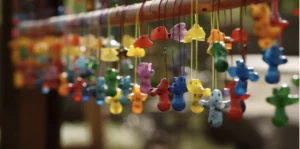Why Are US Businesses Choosing India for Toy Manufacturing?
The toy industry is evolving rapidly, with global shifts in supply chains and manufacturing practices. As companies seek to diversify production and reduce dependence on a single market, India has emerged as a key player in the toy manufacturing sector. Its skilled labor, cost advantages, and supportive government policies make it an attractive destination for US businesses. This blog explores why US companies are increasingly choosing India for toy manufacturing, with real-life examples of businesses that have successfully made the shift.
1. Cost-Effective Production
One of the biggest draws for US businesses is the cost-effectiveness of manufacturing in India. Labor costs in India are significantly lower than in the US or even in China, allowing companies to reduce production expenses without compromising on quality. Additionally, the cost of raw materials such as plastics, textiles, and metals is often cheaper in India, making it easier for companies to maintain competitive pricing on their products.
Hasbro’s Shift to India
Hasbro, one of the world’s leading toy manufacturers, has been gradually moving its production out of China and into other countries, including India. This shift is part of Hasbro’s larger strategy to reduce costs and diversify its supply chain. By manufacturing in India, Hasbro has been able to maintain product quality while benefiting from lower labor and production costs. This move also helps the company mitigate risks associated with over-reliance on a single market.
2. Skilled Labor and Expertise
India’s large and skilled labor force is another reason why US companies are choosing to manufacture toys in the country. Indian workers have expertise in various aspects of toy production, including plastics, electronics, and textiles. This skill set allows for the production of a wide range of toys, from simple plastic figures to more complex electronic and educational toys.
Mattel’s Partnership with Indian Manufacturers
Mattel, the maker of iconic brands like Barbie and Hot Wheels, has leveraged India’s skilled workforce to produce high-quality toys at competitive prices. By partnering with Indian manufacturers, Mattel has been able to tap into the country’s vast labor pool to ensure consistent quality and innovation. India’s skilled workers allow Mattel to produce both simple and complex toys, meeting the diverse needs of the global toy market.
3. Proximity to Raw Materials
India is home to a wide variety of raw materials that are essential for toy manufacturing. Whether it’s plastics, textiles, or metals, India offers easy access to the materials needed for producing toys. This proximity to raw materials not only reduces transportation costs but also shortens production timelines, helping companies get their products to market more quickly.
Funskool’s Efficient Production
Funskool India, one of the country’s largest toy manufacturers, has been able to leverage India’s access to raw materials to streamline its production process. Funskool produces toys for both domestic and international markets, including collaborations with US brands. By sourcing raw materials locally, Funskool has been able to reduce costs and increase production efficiency, making it a reliable partner for global toy brands looking to expand their manufacturing base in India.
4. Government Support and Incentives
The Indian government has taken significant steps to promote local manufacturing, including the toy industry. The Make in India initiative, launched in 2014, aims to boost domestic manufacturing by offering tax incentives, subsidies, and other benefits to foreign investors. The government has also introduced higher import duties on toys to encourage local production, creating a favorable environment for companies looking to set up manufacturing operations in India.
Lego’s Exploration of India’s Market
While Lego has traditionally relied on manufacturing in Europe and China, the Danish toy company has been exploring India as a potential hub for production. With support from the Indian government’s incentives for foreign manufacturers, Lego is considering expanding its manufacturing footprint in India. The company sees India as a strategic location for producing toys not only for the domestic market but also for export to other parts of Asia and beyond.
5. Safety and Quality Standards
US companies are particularly concerned about maintaining strict safety and quality standards when outsourcing manufacturing. India has made significant strides in ensuring that its manufacturing processes meet international safety regulations. Many Indian toy manufacturers are ISO-certified and comply with global safety standards, including the Consumer Product Safety Improvement Act (CPSIA) in the US and CE certifications for European markets.
Green Toys’ Partnership with Indian Manufacturers
Green Toys, a US-based company known for producing eco-friendly toys made from recycled materials, has partnered with Indian manufacturers to maintain high safety and sustainability standards. By working with Indian factories that meet international safety certifications, Green Toys can ensure that its products are both safe for children and environmentally responsible. The partnership allows Green Toys to produce high-quality, safe toys while adhering to the company’s mission of sustainability.
6. Sustainability and Eco-Friendly Manufacturing
As consumers become more environmentally conscious, many companies are shifting toward sustainable manufacturing practices. India is well-positioned to support this trend, with manufacturers adopting eco-friendly methods such as using biodegradable plastics and incorporating recycled materials into production. US companies that prioritize sustainability are finding Indian manufacturers to be valuable partners in achieving their environmental goals.
PlanToys and India’s Sustainable Approach
PlanToys, a company known for its wooden toys made from rubberwood, has collaborated with Indian manufacturers to create sustainable toys. India’s growing focus on sustainability in manufacturing has made it an ideal partner for PlanToys, which aims to reduce its environmental footprint. By working with Indian manufacturers, PlanToys can produce eco-friendly toys that meet both global standards and consumer demand for sustainable products.
7. Strategic Location and Export Capabilities
India’s strategic location in South Asia makes it an ideal hub for exporting toys to various global markets, including the US, Europe, and Asia. India has a well-developed network of ports and shipping routes, allowing for efficient distribution of products. Additionally, India has established Free Trade Agreements (FTAs) with several countries, making it easier for manufacturers to export goods at reduced tariffs.
Fisher-Price’s Global Distribution
Fisher-Price, a leading toy brand under Mattel, has utilized Indian manufacturers for the production of toys that are then exported to markets around the world. India’s strategic location and growing infrastructure have allowed Fisher-Price to efficiently ship products to the US and Europe, reducing lead times and transportation costs. By using India as a manufacturing base, Fisher-Price can meet the demands of its global consumer base while maintaining competitive pricing.
Conclusion: India’s Growing Role in Global Toy Manufacturing
India’s toy manufacturing industry is on the rise, and US businesses are increasingly recognizing the benefits of setting up production in the country. With its cost-effective labor, skilled workforce, access to raw materials, and government incentives, India presents a compelling option for US companies looking to diversify their supply chains. Companies like Hasbro, Mattel, Green Toys, and Fisher-Price demonstrate that India is not just a viable alternative to traditional manufacturing hubs but a strategic choice that offers long-term benefits.
As India continues to invest in its manufacturing infrastructure and workforce, the country’s role in the global toy industry is set to expand, making it an attractive destination for US businesses looking to increase their production capacity and global reach.
Looking to expand your toy manufacturing business and reduce production costs? Setting up a toy factory in India offers you access to a skilled workforce, cost-effective production, and government incentives that can help you scale efficiently. With India’s strategic location and growing infrastructure, now is the perfect time to diversify your supply chain and tap into this vibrant market. Avenue Consumer Brands is your trusted partner to navigate the complexities of setting up operations in India. We provide end-to-end support, from finding reliable manufacturing partners to ensuring quality control, so you can focus on growing your business globally.


